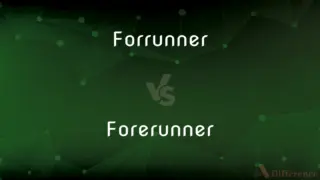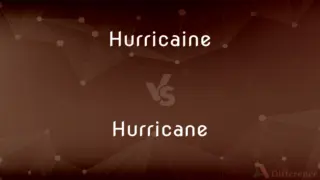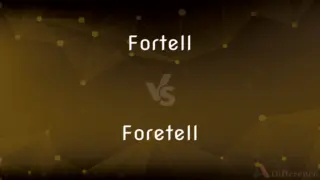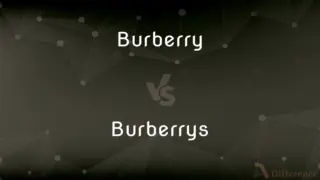Eated vs. Ate — Which is Correct Spelling?
Edited by Tayyaba Rehman — By Fiza Rafique — Updated on March 19, 2024
"Eated" is incorrect; the proper past tense of "eat" is "Ate," referring to having consumed food.

Table of Contents
Which is correct: Eated or Ate
How to spell Ate?

Eated
Incorrect Spelling

Ate
Correct Spelling
ADVERTISEMENT
Key Differences
Memorize by associating “Ate” with a plate, which rhymes.
Remember it by saying "I ate" instead of "I eated."
Think of the phrase “I ate eight apples” to associate “ate” with numbers.
Relate "Ate" to common phrases like "He ate dinner."
Remember "Ate" as the first three letters of “eat” but for past actions.
ADVERTISEMENT
How Do You Spell Ate Correctly?
Incorrect: I eated dinner early yesterday.
Correct: I ate dinner early yesterday.
Incorrect: She eated all her vegetables without complaining.
Correct: She ate all her vegetables without complaining.
Incorrect: He eated the last piece of pizza.
Correct: He ate the last piece of pizza.
Incorrect: They eated quickly before heading to the movie.
Correct: They ate quickly before heading to the movie.
Incorrect: We eated at a new restaurant last weekend.
Correct: We ate at a new restaurant last weekend.
Ate Definitions
To have consumed food.
They ate hungrily.
To have ingested something.
She ate an apple.
Expressing completed action of eating.
He ate rapidly.
Indicates a past event of nourishment.
We ate pasta.
(in the Philippines) an elder sister
My ate is always there for me
Past tense of eat.
The goddess of criminal rashness and consequent punishment.
Past participle of eat
(Philippines) An elder sister
(Philippines) A respectful title or form of address for an older woman.
The preterit of Eat.
The goddess of mischievous folly; also, in later poets, the goddess of vengeance.
Goddess of criminal rashness and its punishment
Past simple form of "eat".
She ate breakfast.
Ate Meaning in a Sentence
We ate pancakes for breakfast this morning.
She ate her lunch alone in the park.
I ate the apple pie you left on the counter.
He ate the entire cake by himself.
He ate the sandwich as if he hadn't eaten in days.
She ate a healthy salad for dinner.
We ate sushi at the new Japanese restaurant.
They ate too much candy and felt sick afterward.
I ate a piece of chocolate cake for dessert.
We ate at our favorite diner last night.
They ate popcorn while watching the movie.
She ate a granola bar before her workout.
They ate pizza at the office party.
I ate a big breakfast so I wouldn't be hungry later.
The children ate their snacks during the break.
She ate a vegetarian meal at the new cafe.
We ate burgers and fries for our weekend treat.
He ate quietly, lost in thought.
She ate a small snack to tide her over until dinner.
They ate a late dinner after the concert.
We ate ice cream even though it was cold outside.
I ate the last apple in the fruit bowl.
He ate every last bite of his meal.
He ate the spicy food without breaking a sweat.
They ate together, enjoying each other's company.
Ate Idioms & Phrases
Ate like a horse
To eat a lot.
After the hike, he was so famished he ate like a horse.
Ate my words
To take back what one said, especially after being proven wrong.
After the team won, I had to eat my words for doubting them.
Ate up with envy
To be very envious.
She was ate up with envy when she saw her friend's new car.
Ate out of someone's hand
To be completely controlled or manipulated by someone.
The charismatic leader had everyone eating out of his hand.
Ate it up
To believe something completely, often gullibly.
The audience ate it up when the magician performed his trick.
Ate one's heart out
To feel great sadness or despair.
She ate her heart out after the breakup.
Ate like a bird
To eat very little.
She wasn't very hungry and ate like a bird at dinner.
Ate to one's heart's content
To eat as much as one desires.
At the buffet, we ate to our heart's content.
Ate away at
To erode or diminish gradually.
The constant criticism ate away at his confidence.
Ate dirt
To be humiliated or defeated.
The boastful player ate dirt after losing the match.
Common Curiosities
Why is it called Ate?
It comes from Old English “ǣt,” the past tense of “etan” (to eat).
Which vowel is used before Ate?
Vowels like “I” or “he/she/we” might precede “ate.”
What is the verb form of Ate?
Ate is the past tense verb form of eat.
What is the singular form of Ate?
Ate serves as both singular and plural.
What is the pronunciation of Ate?
/eɪt/ in American English.
Which article is used with Ate?
No article is used directly before “ate.”
Is Ate a negative or positive word?
Neutral.
What is the root word of Ate?
The root word is "eat."
Which conjunction is used with Ate?
"And," as in "He ate and left."
Is the word Ate imperative?
No.
Which preposition is used with Ate?
Various, such as "He ate with friends."
Is Ate an adverb?
No.
Is Ate a collective noun?
No.
How many syllables are in Ate?
One.
What is the plural form of Ate?
Ate.
Is Ate an abstract noun?
No.
Is the word “Ate” a Direct object or an Indirect object?
Neither, it’s a verb.
What is the opposite of Ate?
Starved or fasted.
Which determiner is used with Ate?
No specific determiner.
Is Ate a noun or adjective?
Verb.
Is Ate a vowel or consonant?
It's a word with both vowel and consonant.
What part of speech is Ate?
Verb.
What is the third form of Ate?
Eaten.
Is Ate a countable noun?
No.
Is the Ate term a metaphor?
No.
Is the word Ate a Gerund?
No.
What is a stressed syllable in Ate?
/eɪt/
What is the second form of Ate?
Ate.
How is Ate used in a sentence?
"She ate the sandwich quickly due to hunger."
How do we divide Ate into syllables?
Ate is one syllable.
What is another term for Ate?
Consumed.
What is the first form of Ate?
Eat.
Share Your Discovery

Previous Comparison
Attrite vs. Attrit
Next Comparison
Franchiser vs. FranchisorAuthor Spotlight
Written by
Fiza RafiqueFiza Rafique is a skilled content writer at AskDifference.com, where she meticulously refines and enhances written pieces. Drawing from her vast editorial expertise, Fiza ensures clarity, accuracy, and precision in every article. Passionate about language, she continually seeks to elevate the quality of content for readers worldwide.
Edited by
Tayyaba RehmanTayyaba Rehman is a distinguished writer, currently serving as a primary contributor to askdifference.com. As a researcher in semantics and etymology, Tayyaba's passion for the complexity of languages and their distinctions has found a perfect home on the platform. Tayyaba delves into the intricacies of language, distinguishing between commonly confused words and phrases, thereby providing clarity for readers worldwide.









































